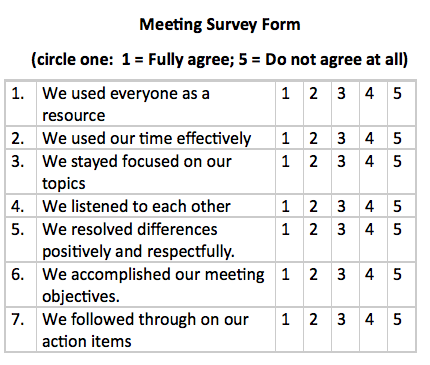What would your employees say about how you facilitate a meeting?
 I remember my first senior management meeting when I became a new employee for an international firm. This meeting was regularly set for once a month at 10:00am. I had been attending meetings at various organizations for some time and had certain expectations. As a newcomer, I wanted to be on time and get a decent seat in this large room. I arrived about five minutes early. Not a soul was there. Some employees came straggling in around 10:00, when strangely there were still lots of seats available. By 10:15 it seemed that everyone had arrived, except the president of the company, who was the facilitator. No one seemed concerned with the late start – in fact, it seemed to be the norm for this meeting.
I remember my first senior management meeting when I became a new employee for an international firm. This meeting was regularly set for once a month at 10:00am. I had been attending meetings at various organizations for some time and had certain expectations. As a newcomer, I wanted to be on time and get a decent seat in this large room. I arrived about five minutes early. Not a soul was there. Some employees came straggling in around 10:00, when strangely there were still lots of seats available. By 10:15 it seemed that everyone had arrived, except the president of the company, who was the facilitator. No one seemed concerned with the late start – in fact, it seemed to be the norm for this meeting.
As an adult, who likely has a mild case of undiagnosed ADHD, I am wiggling in my chair. I thought we’d be through a couple of agenda items by now. It’s 10:30, and we were finally good to go. Well, except there was no agenda. Everyone was calm, except me. I was beginning to resent the time lost when I could be ramping up my new programs. Looking back, everyone actually seemed disengaged and that was also becoming true for me. The topics shifted without direction and some participants rambled along taking the lion’s share of time. Some participants pulled out their PDAs and drifted through their emails as though they were alone in the room. The meeting droned on and on. Nothing substantial happened for two long hours. (Well, I did get a chance to practice patience.)
Sound familiar? If you’re not prepared, running a meeting can be like herding cats. By the end of the meeting the cats aren’t very happy and they probably never did get in the box as you had hoped.
When you ask the average employee if he or she thinks meetings are useful, you can be pretty sure the answer will be no. If you’re wondering whether you run an effective meeting or not, here’s a quick survey you can hand out to your meeting participants. When you get the results, you’ll know if you need to read the quick tips for effective meeting management at the end of this blog.

Six quick tips to help those new to effective meeting management.
- Have a clearly defined purpose for each meeting.
- Invite only those employees who absolutely need to be at the meeting.
- Have an agenda for every meeting.
- Agree on basic rules for the meeting.
- Prepare action items as the meeting progresses.
- Follow up on the action items at the next meeting.
Running an effective meeting sends the message that you respect your employees and their time.

